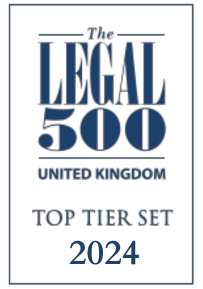Some immigration categories can lead to settlement in the UK. This is also referred to as Indefinite Leave to Remain (‘ILR’).
The requirements for settlement will be dependent on the category in which you are applying, but will usually include passing the Life in the UK Test, an English language test and meeting the good character requirement. In recent years, the Government has made this status increasingly difficult to achieve.
From exacting criteria for continuous and lawful residence to being caught out by minor historical errors on tax forms, the route to achieving settlement in the UK can be beset by challenges.
As the pre-eminent set of immigration barristers in the UK, ranked band 1 in Chambers UK Bar Guide, we help our clients have the best prospects of indefinite leave to remain (ILR).
How we can help
Our barristers work at the forefront of immigration law, and we are committed to defending our clients’ rights to work and live in the UK.
We can provide:
- Expert legal advice on the requirements of the complex Immigration Rules for settlement
- Independent assessment of your prospects of qualifying for settlement
- Meticulous preparation of applications for the best chance of success
- Drafting of a strong covering letter highlighting the merits of your case, and citing the most relevant legal provisions and precedents to ensure success
- Unrivalled expertise in appeals where an application is refused
There are several categories of application for indefinite leave to remain, as set out below.
At Garden Court we have significant experience of the setbacks that can beset applications from business individuals for ILR, such as meeting the continuous residency requirements for people who need to travel extensively for work. Our focussed preparation and expertise has helped many investors and entrepreneurs achieve ILR, ending the worry of visa restrictions and achieving more certainty and stability in family life.
EU Settlement scheme
EEA nationals and their family members who are currently living in the UK can apply via the EU Settlement Scheme for ILR (also known as Settled Status). You can apply up until 30 June 2021, or 31 December 2020 if the UK leaves the EU without a deal.
Settled status
If you have been living in the UK for 5 years or more continuously, you will be eligible for settled status. This allows you to remain in the UK permanently with the ability to work, study, use the NHS, access benefits and pensions and travel freely in and out of the country.
Pre-settled status
Those EU nationals who have not yet built up five years residency in the UK can apply for pre-settled status. On achieving five years residence, they will be eligible for Settled Status.
Our barristers can provide expert advice on your rights in the UK under the new EU Settlement Scheme. This includes an assessment of your eligibility for settled or pre-settled status, and any assistance with applications via the EU Settlement Scheme, and refusals of settled status applications.
We can give the most effective advice on your options if you have a minor conviction which needs to be presented in the best possible light, and help map the fastest route to British citizenship.
settlement via investment in the uk
Tier 1 Investor Route
The Tier 1 Investor category is for non-EEA nationals who have made an investment of at least £2 million in the UK in qualifying investments. After five years of continuous residence in the UK in this category, and providing you meet the eligibility requirements, you can apply for settlement. There are accelerated settlement opportunities for larger-scale investments.
You can apply for a Tier 1 (Investor) visa if:
- you want to invest £2 million or more in the UK
- you’re from outside the European Economic Area (EEA) and Switzerland
- you’re 18 years of age or over
- you’re able to prove that the money belongs to either you or your husband, wife, unmarried or same-sex partner
- you have opened an account at a UK regulated bank to use for your funds
Your funds must be:
- held in one or more regulated financial institutions
- free to spend (‘disposable’) in the UK
Although the route can be speedy and straightforward if properly handled, there are pitfalls. The Home Office will audit applications to check the precise source of the investment funds and to make sure the funds are fully under the investor’s control.
Tier 1 Entrepreneur route (now closed)
The Tier 1 Entrepreneur category was created for non-EEA nationals who want to invest in a new or existing business in the UK. This route is now closed to new applicants from 29 March 2019. However, if you currently have leave in the Tier 1 Entrepreneur category you can continue to apply to extend your stay until 5 April 2023 and apply to settle in the UK as a Tier 1 Entrepreneur until 5 April 2025. And many first-time applicants are still fighting refusals, often because the Home Office refused to recognise that their business proposal was viable or genuine.
If you are a Tier 1 Graduate Entrepreneur or you previously held leave as a Tier 1 Graduate Entrepreneur and have since switched into the Startup category, you can switch into the Tier 1 Entrepreneur category until 5 July 2021. You will be able to apply to extend your stay as a Tier 1 Entrepreneur until 5 July 2025 and apply to settle in the UK as a Tier 1 Entrepreneur until 5 July 2027.
Entrepreneurs often face problems with satisfying the highly technical requirements of the Rules, particularly where their job creation involves complex staff movements.
You can apply to extend your visa if you:
- registered as a director or as self-employed no more than 6 months after the date you were given permission to stay in the UK under a Tier 1 (Entrepreneur) visa
- can prove you’ve been self-employed, a member of a partnership or working as a director of a business 3 months before you apply
- created at least 2 full-time jobs that have existed for at least 12 months
- can continue to support yourself
You must have invested into 1 or more UK businesses either:
- £200,000 in cash
- £50,000 in cash
We can help with the main issues that affect the Entrepreneur route, be they job creation problems that apply to extension applications or allegations made about the business venture’s genuineness.
Tier 1 Innovator Route
This category was brought in March 2019 to replace the Tier 1 Entrepreneur route for more experienced business people. The period of time in which applicants can obtain indefinite leave to remain is down from five years to three years, as long as certain criteria are met regarding investment, research, revenues or job creation. We can advise you on the best strategy to obtain settlement.
Before you apply you need to have your business or business idea assessed by an approved body. They will provide you with an endorsement letter if your business is viable.
You must also:
- meet the English language requirement
- be at least 18 years old
- be able to prove that you have enough personal savings to support yourself while you’re in the UK
- Have at least £50,000 in investment funds to apply for an Innovator visa if you want to set up a new business
- Have had at least £945 in your bank account for 90 consecutive days before you apply.
- pass an approved English language test with at least CEFR level B2 in reading, writing, speaking and listening (exceptions apply for nationals from certain countries) or have an academic qualification that was taught in English and is recognised by UK NARIC as being equivalent to a UK bachelor’s degree, master’s degree or PhD
Tier 1 Start-up Route
This category was introduced in March 2019 to replace the Tier 1 Graduate Entrepreneur route. It is open to applicants starting a new business for the first time in the United Kingdom, not just to graduates. This category offers leave for two years, up from one year under the Tier 1 Graduate Entrepreneur route. It does not lead directly to settlement but allows applicants to switch into the Innovator route to continue to grow their business and then apply for settlement.
You can apply for a Start-up visa if you:
- want to set up a business in the UK
- are from outside the European Economic Area (EEA) and Switzerland
Before you apply you need to have your business or business idea assessed by an approved body. You must be endorsed by an authorised body that is either:
- UK higher education institution
- a business organisation with a history of supporting UK entrepreneurs
You must be able to show that your business idea is:
- a new idea - you cannot join or invest in a business that is already trading
- innovative - you must have an original business idea that is different from anything else on the market
- viable, with potential for growth
To be eligible you must:
- be at least 18 years old
- meet the English language requirement
- prove that you have enough personal savings to support yourself while you’re in the UK. You need to have had at least £945 in your bank account for 90 consecutive days before you apply
- pass an approved English language test with at least CEFR level B2 in reading, writing, speaking and listening (exceptions apply for nationals from certain countries) or have an academic qualification that was taught in English and is recognised by UK NARIC as being equivalent to a UK bachelor’s degree, master’s degree or PhD
partners and family members
As the partner or family member of a British Citizen or settled person in the UK, you can apply for indefinite leave to remain if you meet certain criteria.
Spouses, civil partners and unmarried partners
You will need to have spent five years in the UK as the partner of a British Citizen or settled person and meet strict financial requirements under Appendix FM of the Immigration Rules. You will also need to demonstrate that the relationship is still subsisting, pass the Life in the UK test and English Language requirements, unless an exemption applies.
Adult dependent relatives and children
It will need to be demonstrated that you will be adequately maintained, accommodated and cared for without recourse to public funds. You don’t need to pass the Life in the UK test and there is no English language requirement.
Garden Court Chambers is one of the largest barristers’ chambers in London, with unrivalled crossover expertise, most notably in immigration and family law. We have helped many spouses, civil partners and unmarried couples obtain settlement allowing them to continue their family life in the UK. Our leading work in children’s law is recognised by Chambers and Partners UK Bar Guide and we pride ourselves on standing up for vulnerable individuals who need care.
work related
If you are in the UK as a Tier 2 (General) migrant or a Sole Representative of an Overseas Business you may be eligible to apply for ILR.
Applicants are required to:
- have spent five years lawfully in the UK
- have not been absent from the UK for more than 180 days in any rolling 12 calendar month period preceding the date of application
- meet the English Language requirements (unless an exemption applies)
- have passed the Life in the UK test (unless an exemption applies)
Our barristers are experts in the points based system and we can provide clear advice and practical support on applications for work-related settlement in the UK. But we don’t just handle standard cases. We are adept at providing effective advice where there has been significant absence abroad, and when applications need to made which call for the exercise of Home Office discretion. We have helped many clients to attain indefinite leave to remain, releasing them from visa restrictions and increasing their employment prospects.
long residence
If you have lived in the UK lawfully for 10 years you can apply for indefinite leave to remain.
Applicants are required to:
- have permission to stay (‘leave to remain’). This can be in any immigration category, or a combination of different immigration categories.
You must also have:
- been in the UK legally for 10 years (known as your ‘continuous residence’)
- kept to the terms of your UK visa
If you’re aged 18 to 65 years old, you must:
- pass the Life in the UK Test
- prove you have sufficient English language skills
In considering ‘lawful residence’, the UK Border Agency will look at factors such as the applicant’s character, conduct, associations and employment history. There should be no evidence that granting ILR would contravene the public good.
A person living in the UK for 20 years or more, either lawfully or unlawfully, can apply for leave to remain on the grounds of private life. After a further ten years residency, he or she can apply for indefinite leave to remain. These applications require real expertise in obtaining the most persuasive kinds of evidence to demonstrate length of residence.
10 year residence applications often face problems due to short breaks in leave or excess absence abroad. 20 year residence applications require the greatest attention to detail and often have to be pursued to appeal. We are experts at dealing with both kinds of case.
returning residents
A non-UK citizen who previously had indefinite leave to remain in the UK but is not currently resident there may be granted settlement status as a returning resident.
You will need to satisfy the Immigration Officer on arrival that you:
- had indefinite leave to remain in the UK when you last left
- didn’t receive help from public funds towards the cost of leaving the UK
- now seek admission in order to settle in the UK
If you have been away from the UK for more than two years or are concerned about meeting any of the above criteria, you should apply for a Returning Resident Visa before travelling to the UK. You will need to show there are good reasons that you should be admitted as a returning resident. These can include having strong family ties in the UK, or having lived in the UK for most of your life, but there may be other reasons.
If your application for settlement is refused, you have the right of appeal against the decision, if you have raised a human rights claim as part of your application. Garden Court is the pre-eminent set of barristers specialising in human rights and immigration law, so you can be sure your case will be handled with unrivalled expertise.
refugees, humanitarian protection and discretionary leave
If you have been recognised as a refugee, you may well want the security of mind that comes with the grant of indefinite leave to remain. When someone risks serious consequences if they were to return to their home country, but do not meet the criteria needed to be classed as a refugee, then they may be granted Humanitarian Protection or Discretionary Leave, because they face serious harm such as the death penalty, unlawful killing, torture or inhuman and degrading treatment, or risks from an armed conflict.
If Humanitarian Protection is granted, the person is entitled leave to enter or remain for five years, after which indefinite leave to remain may be granted. They will have access to public funds, be entitled to work, to apply for an integration loan, and have access to family reunion, on the same basis as refugees.
Our specialist human rights immigration barristers have a high success rate in helping applicants attain ILR via the Humanitarian Protection or Discretionary Leave to Remain route. These applications are often not straightforward. The Home Office will actively review some kinds of case in order to audit whether there is still a need for international protection or for the positive exercise of discretion.
We provide clear, detailed advice and practical help with preparing the forms for submission, working out a strong legal framework to support your application. We follow up with the UK Border Agency if there are problems or questions related to your application, and can adeptly handle appeals or applications for administrative or judicial review should your application be denied.
why choose garden court?
Garden Court’s Immigration Team is recognised as the pre-eminent set of barristers in the UK for immigration law advice. We are the only set of barristers awarded the highest ‘Band 1’ status for immigration law advice by the independent Chambers Bar Guide rankings. You can be assured your case will be handled with unrivalled levels of expertise.
We know the immigration system from end to end, and have seen every kind of problem. Our barristers have appeared in many of the cases that have shaped immigration law in the UK. We understand the way that government decision-makers and judges think, and are thus very well placed to advise on how best to present a case from the earliest stages. All of the leading guides for immigration lawyers have been written by members of our immigration law team.
If your case is really important to you, then you may well want to instruct a senior barrister who is well known in the immigration Tribunal system and has very extensive legal experience. You may alternatively prefer to instruct a ‘junior’, who will still be experienced and knowledgeable, but can handle cases more cost-effectively. We have a barrister to suit every situation, backed up by a sophisticated support team that helps you every step of the way.
The Team

Sonali Naik KC
Year of Call: 1991
Year of Silk: 2018

Nicola Braganza KC
Year of Call: 1992
Year of Silk: 2022

Irena Sabic KC
Year of Call: 2002
Year of Silk: 2023

Greg Ó Ceallaigh KC
Year of Call: 2006
Year of Silk: 2024

Kathryn Cronin
Year of Call: 1980

Peter Jorro
Year of Call: 1986

Rebecca Chapman
Year of Call: 1990

David Jones
Year of Call: 1994

Grace Brown
Year of Call: 1995

Louise Hooper
Year of Call: 1997

Patrick Lewis
Year of Call: 1997

Adrian Berry
Year of Call: 1998

Gordon Lee
Year of Call: 1998

Ronan Toal
Year of Call: 1999

Bojana Asanovic
Year of Call: 2000

Sadat Sayeed
Year of Call: 2001

Colin Yeo
Year of Call: 2002

Abigail Smith
Year of Call: 2003

Andrew Eaton
Year of Call: 2004

Mark Symes
Year of Call: 2004

Helen Foot
Year of Call: 2008

Ali Bandegani
Year of Call: 2009

Gráinne Mellon
Year of Call: 2010

Taimour Lay
Year of Call: 2011

David Sellwood
Year of Call: 2012
Ubah Dirie
Year of Call: 2014

Matthew Ahluwalia
Year of Call: 2015

Zehrah Hasan
Year of Call: 2016

Ella Gunn
Year of Call: 2018

Eva Doerr
Year of Call: 2019












